Intro
Identify pre heart attack symptoms in men, including chest pain, shortness of breath, and fatigue, to prevent cardiac arrest and coronary heart disease.
Heart attacks can be devastating, and it's essential to recognize the warning signs to take prompt action. While heart attacks often seem to strike without warning, many men experience pre-heart attack symptoms that can signal an impending cardiac event. Understanding these symptoms can help men take preventive measures and seek medical attention if necessary. In this article, we'll delve into the common pre-heart attack symptoms in men, their causes, and what to do if you experience them.
The importance of recognizing pre-heart attack symptoms cannot be overstated. According to the American Heart Association, about 50% of men who die from coronary heart disease experience no previous symptoms. However, many men do experience warning signs, which can be subtle or overt. By being aware of these symptoms, men can take steps to reduce their risk of a heart attack and improve their overall cardiovascular health. In addition, recognizing pre-heart attack symptoms can help men seek medical attention promptly, which can significantly improve their chances of survival and recovery.
Pre-heart attack symptoms in men can be attributed to various factors, including atherosclerosis, high blood pressure, high cholesterol, and lifestyle factors such as smoking, obesity, and physical inactivity. As plaque builds up in the arteries, it can cause a range of symptoms, from mild to severe. By understanding the underlying causes of pre-heart attack symptoms, men can take targeted steps to mitigate their risk and improve their heart health. Furthermore, recognizing the interplay between lifestyle factors and cardiovascular health can empower men to make informed choices about their diet, exercise, and stress management.
Common Pre-Heart Attack Symptoms in Men
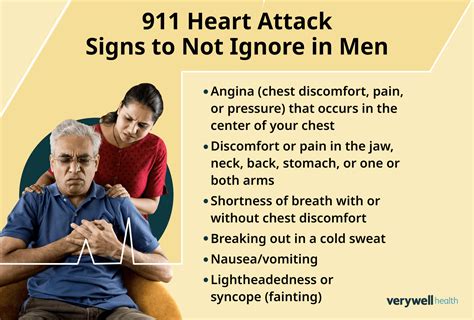
Men may experience a range of pre-heart attack symptoms, including chest pain or discomfort, shortness of breath, pain or discomfort in the arms, back, neck, jaw, or stomach, feeling weak, light-headed, or faint, cold sweats, nausea or vomiting, and fatigue. These symptoms can be caused by reduced blood flow to the heart, which can lead to a heart attack. It's essential to recognize these symptoms and seek medical attention if they persist or worsen over time.
Chest Pain or Discomfort
Chest pain or discomfort is one of the most common pre-heart attack symptoms in men. This pain can feel like pressure, tightness, or heaviness in the chest, and it may radiate to other areas, such as the arms, back, or jaw. The pain can be constant or intermittent and may worsen with physical activity or stress. If you experience chest pain or discomfort, it's crucial to seek medical attention immediately.Shortness of Breath
Shortness of breath is another common pre-heart attack symptom in men. This can occur when the heart is not pumping enough blood to meet the body's needs, leading to a lack of oxygen in the blood. Men may experience shortness of breath during physical activity or at rest, and it can be accompanied by other symptoms such as chest pain or fatigue.Causes of Pre-Heart Attack Symptoms
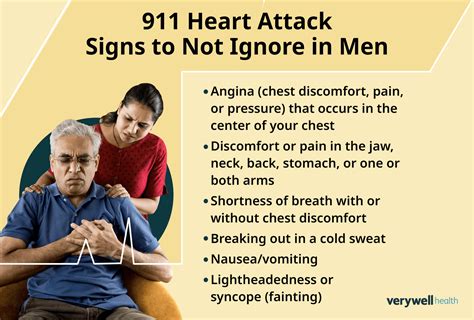
Pre-heart attack symptoms in men can be caused by various factors, including atherosclerosis, high blood pressure, high cholesterol, and lifestyle factors such as smoking, obesity, and physical inactivity. Atherosclerosis, or the buildup of plaque in the arteries, is a significant contributor to pre-heart attack symptoms. As plaque accumulates, it can cause the arteries to narrow, reducing blood flow to the heart and increasing the risk of a heart attack.
Atherosclerosis
Atherosclerosis is a condition in which the arteries become clogged with plaque, a substance composed of fat, cholesterol, and other substances. Over time, the plaque can build up and cause the arteries to narrow, reducing blood flow to the heart. This can lead to a range of pre-heart attack symptoms, including chest pain, shortness of breath, and fatigue.High Blood Pressure
High blood pressure, or hypertension, is another significant contributor to pre-heart attack symptoms in men. High blood pressure can cause the arteries to become damaged, leading to atherosclerosis and reducing blood flow to the heart. Men with high blood pressure may experience symptoms such as chest pain, shortness of breath, and headaches.Diagnosing Pre-Heart Attack Symptoms
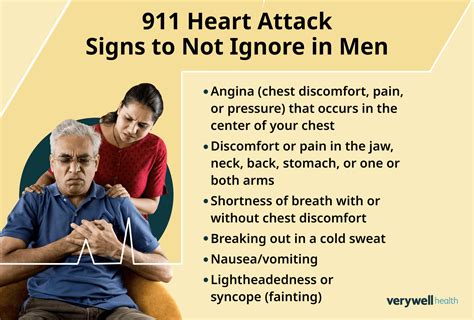
Diagnosing pre-heart attack symptoms in men typically involves a combination of physical examination, medical history, and diagnostic tests. The doctor may perform a physical examination to check for signs of heart disease, such as high blood pressure or abnormal heart sounds. The doctor may also take a medical history to determine if the patient has any risk factors for heart disease, such as a family history of heart disease, high cholesterol, or smoking.
Electrocardiogram (ECG or EKG)
An electrocardiogram (ECG or EKG) is a diagnostic test that measures the electrical activity of the heart. The test can help the doctor determine if the patient has had a heart attack or if there is any damage to the heart muscle. The doctor may also use the ECG to monitor the patient's heart rhythm and check for any abnormalities.Stress Test
A stress test, also known as a treadmill test or exercise test, is a diagnostic test that measures the heart's ability to function under stress. The test can help the doctor determine if the patient has any coronary artery disease or if there are any blockages in the arteries.Treatment and Prevention of Pre-Heart Attack Symptoms
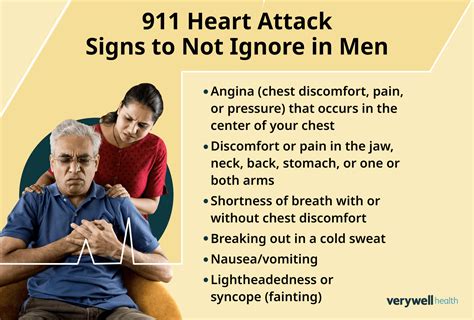
Treatment and prevention of pre-heart attack symptoms in men typically involve a combination of lifestyle changes and medical interventions. The doctor may recommend lifestyle changes such as quitting smoking, exercising regularly, and eating a healthy diet. The doctor may also prescribe medications to help lower blood pressure, cholesterol, and other risk factors for heart disease.
Lifestyle Changes
Lifestyle changes can play a significant role in preventing pre-heart attack symptoms in men. Quitting smoking, exercising regularly, and eating a healthy diet can help reduce the risk of heart disease. Men can also reduce their risk by managing stress, getting enough sleep, and maintaining a healthy weight.Medications
Medications can also play a crucial role in preventing pre-heart attack symptoms in men. The doctor may prescribe medications to help lower blood pressure, cholesterol, and other risk factors for heart disease. Men may also be prescribed medications to help prevent blood clots and reduce the risk of a heart attack.Conclusion and Next Steps
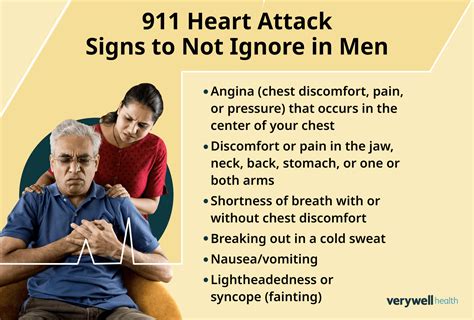
In conclusion, pre-heart attack symptoms in men can be a warning sign of an impending cardiac event. By recognizing these symptoms and taking prompt action, men can reduce their risk of a heart attack and improve their overall cardiovascular health. If you experience any of the symptoms mentioned in this article, it's essential to seek medical attention immediately. Remember, prompt treatment can significantly improve your chances of survival and recovery.
We invite you to share your thoughts and experiences with pre-heart attack symptoms in the comments below. Have you or someone you know experienced any of these symptoms? What steps did you take to address them? By sharing your story, you can help raise awareness about the importance of recognizing pre-heart attack symptoms and inspire others to take action.
What are the most common pre-heart attack symptoms in men?
+The most common pre-heart attack symptoms in men include chest pain or discomfort, shortness of breath, pain or discomfort in the arms, back, neck, jaw, or stomach, feeling weak, light-headed, or faint, cold sweats, nausea or vomiting, and fatigue.
How can I reduce my risk of a heart attack?
+You can reduce your risk of a heart attack by quitting smoking, exercising regularly, eating a healthy diet, managing stress, getting enough sleep, and maintaining a healthy weight. You can also work with your doctor to manage any underlying medical conditions, such as high blood pressure or high cholesterol.
What should I do if I experience pre-heart attack symptoms?
+If you experience pre-heart attack symptoms, it's essential to seek medical attention immediately. Call emergency services or visit the emergency room if you experience any of the following symptoms: chest pain or discomfort, shortness of breath, pain or discomfort in the arms, back, neck, jaw, or stomach, feeling weak, light-headed, or faint, cold sweats, nausea or vomiting, or fatigue.
